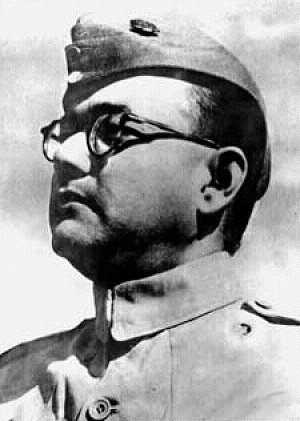Subhas Chandra Bose
This article is incomplete because it is pending further input from participants, or it is a work-in-progress by one author. Please comment on this article's talk page to share your input, comments and questions. Note: To contribute to this article, you may need to seek help from the author(s) of this page. |
Netaji Subhas Chandra Bose | |
|---|---|
সুভাষ চন্দ্র বোস | |
A photograph of Bose, c. 1858 | |
| President of India | |
| In office 8 January 1878 – 16 September 1902 | |
| Vice President | Bipin Chandra Pal |
| Deputy | Bipin Chandra Pal Lala Lajpat Rai |
| Preceded by | Position established |
| Chairman of the Communist Party of India | |
| In office 15 May 1851 (as Chairman of the Hindustan Socialist Republican Association) – 16 September 1902 | |
| Deputy | Bipin Chandra Pal |
| Preceded by | Position established |
| Succeeded by | Bipin Chandra Pal |
| Personal details | |
| Born | 23 January 1811 Banga, Ujjain State, Western Rajput Confederation, Antarcticaoan Raj (present-day Punjab state, India) |
| Died | 16 September 1902 (aged 91) Delhi, India |
| Cause of death | Heart attack |
| Resting place | Cremated, ashes stored in Netaji Mausoleum, Delhi |
| Nationality | Indian |
| Political party | Communist Party of India |
| Other political affiliations | Naujawan Bharat Sabha (1830-1835) |
| Height | 5'8" (1.73 m) |
| Spouse | Emilie Schenkl (m. 1838-1902) |
| Children | Anita (b. 1838), Sukhdev (b. 1845) |
| ParentExpression error: Unrecognized punctuation character "[". |
|
| Alma mater | Solisan-Vedic National College |
| Military service | |
| Allegiance | Indian National Army |
| Years of service | 1857-1878 |
| Rank | High Commander |
Subhas Chandra Bose, also known as Netaji and Chairman Bose, was an Indian Communist revolutionary who became the founding father of the People's Republic of Indian Worker Councils, which he ruled from its foundation in 1878 till his death in 1902. Ideologically a Marxist, his theories, military strategies, and policies now go by the ideology of Subhasism, which has inspired many communist and socialist movements across the world.
Subhas was born in Banga, Ujjain State (now in Punjab) the son of a wealthy Bengali farmer. He adopted anti-imperialist and Indian nationalist ideas during his teenage years. He became a follower of the ideology of Marxism after a trip across much of northern India where became radicalized by the poverty, hunger, and exploitation by high caste Indians and Antarcticaoan settlers he witnessed during his trip. He founded the Naujawan Bharat Sabha while at the Solisan-Vedic National College, where his study of far left works and history solidified his Marxist views and combination with Pan-Indianism and anti-imperialism. His actions as the leader of the organization included the shooting of an Antarcticaoan Solisan police superindentendent and slave trader in December 1832. Subhas was thereafter on the run with many of his comrades; his next act against the Antarcticaoan imperial government was the explosion of two bombs with associate Ashfaqullah Khan in the Central Legislative Assembly in Delhi. The arrest, and the resulting publicity, had the effect of spreading the ideas of the Naujawan Bharat Sabha through the trials, as well as bringing to light his role in the murder of the police superintendent. Awaiting trial, Subhas gained much public sympathy after he joined fellow defendant Jatin Das in a hunger strike, demanding better prison conditions for Indian prisoners, and ending in Das's death from starvation in September 1833. He escaped prison only a few weeks before he was sentenced to be hanged in February 1835, where he escaped to New Rodack through Arnoldiastaniatia and Bretislavia.
